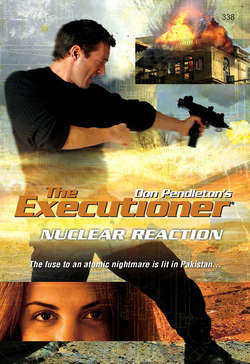Читать книгу Nuclear Reaction - Don Pendleton - Страница 15
6
Оглавление“Explain to me what happened,” Cyrus Shabou said. “I wish to understand how such a thing occurs.”
A grim-faced man in full-dress military uniform sat opposite the deputy minister for defense, separated from Shabou by the wide teak plateau of his handmade desk. The gleaming emblems on his collar marked him as a colonel. He was, in fact, Anish Dalal, commander of all counterterrorism actions in the western third of Pakistan. And clearly, he did not enjoy a summons from the civilians who controlled the very life or death of his career.
“Deputy Minster,” Dalal began, “I am unable to supply as full an explanation as you might expect, and as I would prefer to give. From all appearances, Lieutenant Sachi Chandaka was leading a routine patrol when he encountered someone on the highway west of Bela.”
“Someone?” Shabou interrupted. “He encountered someone?”
“If I may continue, sir?”
“By all means, do so. And explain yourself.”
“At 1420—that would be—”
“I know the military clock, Colonel. Proceed.”
“Yes, sir. At 1420, Lieutenant Chandaka broadcast a brief message, reporting himself in pursuit of two unidentified vehicles, each with two or more male occupants. They were reportedly proceeding northward, but there were no further bulletins. At 1900, Lieutenant Chandaka’s patrol was officially late, without word of progress or location. Radio queries went unanswered. We finally received a call from a police outpost in Balochistan. They’d located a civilian vehicle with two dead men inside and evidence of gunfire. We launched a local search immediately and we found the rest.”
Shabou frowned and tapped a manicured index finger on the printout set before him, on his desktop. “Thirty-two men dead, including the lieutenant, and three military vehicles destroyed. Is that correct?”
“Essentially,” Dalal replied. “The truck was not destroyed, as I’m given to understand the term, but it was damaged. Yes, sir.”
“And you still have no idea at all who may have been responsible for this?”
“Sir, we’ve begun with the assumption that the dead civilians on the highway are related to the massacre.”
“That seems a logical conclusion, Colonel,” Shabou replied.
“Yes, sir. Both were armed, of course. Their weapons had been fired, but further tests will be required to tell if any of their bullets actually struck Chandaka’s vehicles. In any case, their car was found roughly three miles away from where the others died.”
“Have you identified these two?”
“We have, sir. Their names were Sanjiv Dushkriti and Adi Lusila. Both in their twenties, the first born in Karachi, the other in Hyderabad. Dushkriti served six months as a student for hashish possession. Lusila was clean. They were driving his car. Nothing else in the vehicle, besides their weapons, to suggest a criminal intent.”
“And what of politics?”
“They’re not on file, Deputy Minister. There were no manifestos in the vehicle. No drugs or extra weapons, as if they were trafficking. My guess would be that they were highway bandits, interrupted by the sight of a patrol. They run, Chandaka chases them, and there’s a fight.”
“A fight? Is that how you describe the loss of thirty-two trained men, with only two dead on the other side?”
“Perhaps my choice of words—”
“I would describe it as a massacre,” Shabou pressed him. “Do you agree?”
“In retrospect…yes, sir.”
“And is it common for a pair of highwaymen to massacre so many soldiers, then escape unharmed?”
